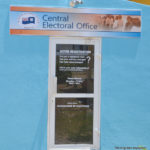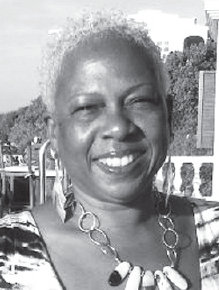The status of the new enabling legislation for preparations for the 2020 elections in Anguilla was discussed in Executive Council shown in recent minutes.
The Minister of Home Affairs, Mrs. Cora Richardson-Hodge, was quoted in the minutes as saying that “the Boundaries Act is being reviewed by the Ministry, while the Elections Act is with the Attorney General’s Chambers. Both pieces of legislation should be published for robust consultations.”
As a follow-up to that information and, as a result of feedback from members of the public, The Anguillian newspaper made its own inquiries. The understanding now, according to the Minister of Home Affairs, is that given the time constraints for the elections scheduled for early 2020, it will not be possible to restructure the boundaries – that is dividing the original seven electoral districts into nine in order to avoid possible voter confusion with the short period.
What is being said, however, is that the island-wide voting for four at large seats, as well as the normal general election in the seven constituencies, will be held at the same time. Voters will be required to place an x next to the name of one of the candidates of their choice presenting themselves for the four at large seats plus an x for one of the candidates contesting the seat. Unlike the Boundaries Bill, the drafting and implementation of the Election Bill are therefore a matter of priority. It is expected that the Government of Anguilla, through the Ministry of Home Affairs, will officially release information about the plans for the upcoming elections in due course.
In order to get an understanding of various other preparations for the elections, The Anguillian newspaper spoke to the Supervisor of Elections, Ms. Aurjul Wilson, who reports directly to the Governor. The former Permanent Secretary in the Ministry of Home Affairs, who conducted the 2015 general election while in her PS post, first commented on the response of persons participating in the continuous voter registration system at the Electoral Office.
“They are coming in slowly, but I anticipate that as the date for the 2010 elections draws nearer that larger numbers of persons will show up to update their information to ensure the issuance of their voter registration.”
Ms. Wilson continued: “I think one of the drawbacks of not having the new legislation is that there are a whole lot of new initiatives – for instance: the voter card, advanced polIs; and a fixed date for the general election – all of which require voter education. But we are still a year and a half away from the elections, and probably people are not seeing that as a priority.
“Other than the fact that I am waiting for people to come in on their own, I would have liked to have the legislation already passed so that I can explain to people what the new changes are. If we are talking, for instance, about advanced polls it is one of the things being considered. That would require some education in terms of who can vote a couple of days before the elections. The intention is to reduce the length of time voters stay in the lines on Election Day. Advanced polls allow election workers, police officers and other essential personnel to vote early.
“I have spoken with the Minister of Home Affairs who seems to think that new election legislation is coming down the pipe fairly soon. I know for sure that the draft is in the Attorney General’s Chambers and they are still working on the Elections Bill. It would have come out of the Constitutional and Electoral Report, that was done in 2016, which offered a number of reforms and took into consideration the recommendations of the overseas observers as well as the Supervisor of Elections in the 2015 Report.”
Ms. Wilson’s personal view is that the time between the submission of the 2016 Report and now was ample time for the restructuring of the boundaries, but that was not part of her remit as she was merely carrying out the requirements of the legislation. “My work is on target, however,” she affirmed. “I have to recognise that there will be some changes with the new legislation. If in fact they are recommending that the four at large seats will still take place, I will have to expand the number of persons who will run the polls. I will have to think about the counting, and all the equipment has to be increased because you won’t add the district’s vote to the at large ballot box – and then we have to figure out how to design the ballot papers.”
“The current boundaries have been established since 1972 and since then there has been a lot of [population] growth – hence the need to revise the boundaries. My understanding, based on what you are saying, or what the Minister said, is that for the 2020 elections they will not enlarge the districts and will have the voting in the seven original districts, but will still have the four seats at large. Either way, I will still have a whole lot of additional work to do but, because my other stuff is already in place it will just be a matter of adding to that. The regular ballot paper is one sheet but I will have to get an additional sheet for at large voting, and I don’t know how many people will be running for the four at large seats.” Ms. Wilson also noted that she would need to have separate ballot boxes for the at large voting and the district polling.
As part of her preparations for the upcoming elections, Ms. Wilson said she had undertaken to discard a number of termite-eaten ballot boxes and to replace them for the 2020 elections.
Despite a number of hurdles to cross, including about a year and a half to prepare for the elections, Ms. Wilson concluded: “I think I have ample time to get all the persons and materials in place that I would need providing I have a budget. I have educated my new workers as to what is expected of them during the voting because they have never voted before so they now have a feeling for that. I have also advised them that coming on closer to elections they will no longer be working part time but full time instead – perhaps way into the evening to get all the preparatory work done.”
She was grateful to Mr. Colville Petty, the former Supervisor of Elections, for the knowledge and confidence she had gained regarding the election process. She further acknowledged that he had been very supportive and remains a resource person up to this day.
She stressed that, in order to carry out the work of the Electoral Office efficiently she was awaiting the necessary budget from the Governor’s Office as well as the required legislation from the Government. She pointed out that without that legislation a lot of people might challenge her on the basis for not having the authority to make the electoral changes.
The Supervisor of Elections reported that she was looking at ways to improve the counting of ballots. Among her considerations is to inquire into the availability and cost-effectiveness of a tabulator which the BVI hopes to use for its elections next year. Another option is to conduct ballot counting in the respective districts as opposed to taking the ballot boxes to the House of Assembly as customary.
Ms. Wilson remains confident that eventually all the varied challenges confronting the Electoral Office will be overcome as the time approaches for both constituency and at large voting. She has suggested that persons seeking updated information on the upcoming elections, and other related matters, should log on to www.gov.ai/electoraloffice.










